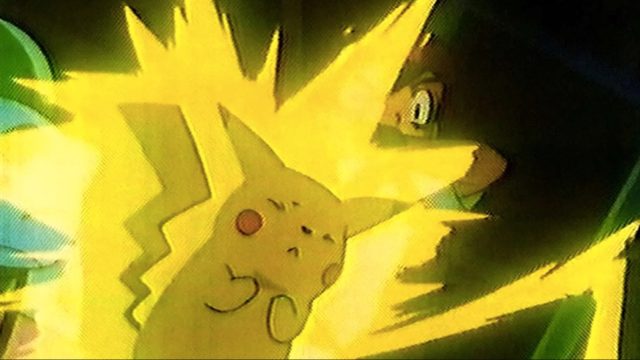This Week You Will Feel No Ill Effects Learning About:
- a dangerous cartoon
- a wet movie
- an auteur’s book
- a nerdy game
- brain parasites!
Thanks to Casper, Rosy Fingers, scb0212 and Son of Griff for contributing this week! Send articles throughout the next week to ploughmandplods [at] gmail, post articles from the past week below for discussion, and Have a Happy Friday!
The Guardian‘s Benjie Goodhart uncovers the truth behind the infamous 1997 Pokémon broadcast that sent hundreds of children to the hospital:
What Radford and Bartholomew discovered was that the vast majority of affected children had become ill after hearing about the programme’s effects. Although the cartoon’s transmission on 16 December did indeed cause hundreds of children to experience symptoms resulting from photosensitive epilepsy, something else was at play in the subsequent cases. The next day, in playgrounds and classrooms, in news bulletins and at breakfast tables, all the talk was of Pokémon Shock. At which point, more children began to feel unwell. This was exacerbated when, astonishingly, some news shows actually screened the offending clip. But this time, the symptoms (headaches, dizziness, vomiting) were, says Radford, “much more characteristic of mass sociogenic illness [MSI] than photosensitive epilepsy”.
Staying at The Guardian, there are many positive reviews of Avatar: The Way of Water to be found, but beloved Soluter Casper enjoys collecting the dunks:
Mark Kermode: Astonishing! Enthralling! Exciting! Immersive! None of these words could sensibly be applied to the three-and-a-quarter-hour Wet Smurfahontas stodgeathon that is Avatar: The Way of Water. A lumbering, humourless, tech-driven damp squib of a movie, this long-awaited (or dreaded?) sequel to one of the highest grossing films of all time builds upon the mighty flaws of its predecessor, delivering a patience-testing fantasy dirge that is longer, uglier and (amazingly) even more clumsily scripted than its predecessor, blending trite characterisation with sub-Roger Dean 70s album-cover designs and thunderously underwhelming action sequences. In water.
Peter Bradshaw: The effects now, technically impressive as they are, amount to high frame-rate motion smoothness which is soulless and inert, creating not so much an uncanny valley but an uncanny Mariana Trench down in the depths. Cameron’s undersea world is like a trillion-dollar screensaver.
David Bordwell dives in to Quentin Tarantino’s new book Cinema Speculation and holds it up against “the criticism of enthusiasm”:
In one of the richest essays in the book, Tarantino suggests that what follows Sarris’s period survey is a new Hollywood, which has two phases. In the first, Penn, Altman, and other filmmakers commit to criticize classic genres, pointing out their political and racial biases. The second phase consists of directors like Spielberg, Lucas, and De Palma who love genres and want to update and strengthen them, or to invent new ones, like the “Revengeamatic.” Tarantino appreciates both trends, but his sympathy lies with the second one. He praises some older genre directors like Don Siegel and is especially sensitive to New Hollywood filmmakers who either worked to update genres (Tobe Hooper) or balanced indulgence in the genre with some critique of it (Taxi Driver, Hardcore).
At Vice, Anna Merlan sheds light on an ongoing game of Diplomacy that is healing Twitter-addicted journalists:
Any online social space is its own little kingdom; it has rules, conventions, power alliances, kings, and pawns. Diplomacy is a quite literal, gamified representation of those dynamics. But it also represents something a lot more interesting: the ways in which hopelessly Twitter-obsessed people, like journalists, have increasingly started retreating into more private online social spaces like group chats, non-work Slack rooms, Close Friends Instagram stories, or Twitter Circles (a setting where you tweet to a smaller group of people). Where Twitter represents a chance to talk to the entire world, spaces like Diplomacy offer a chance to talk to a smaller group, who might get your jokes, or at least engage with your arguments in relative good faith; the sniping and back-stabbing are in good fun, contained within the realm of the game.
And in science news, some researches looked into the possibility that a parasite found in cat poop makes people start their own businesses:
Before wannabe Elon Musks in Silicon Valley start throwing Toxo parties, let me just say: Don’t. Not only would it almost certainly not work, but it could almost make you really sick. “In academia, if we pursue interesting questions like this, maybe we’re a little different, with screws slightly looser,” says Dan Lerner, a business professor at IE University in Spain who studies Toxoplasma’s link to entrepreneurship. “But to read the papers and think, ‘Oh, yeah, let me go eat some cat droppings’ would be a really shitty idea. No pun intended.”


